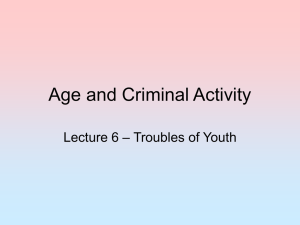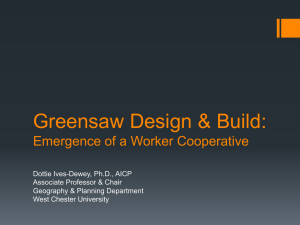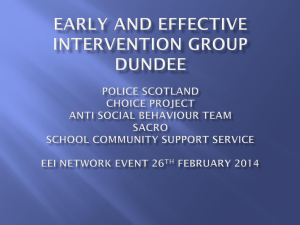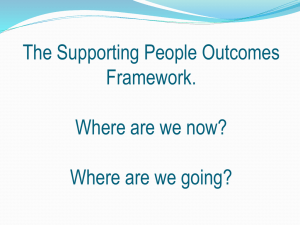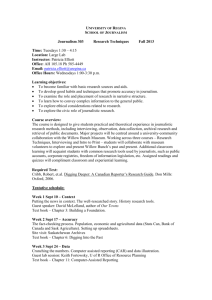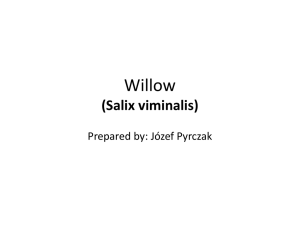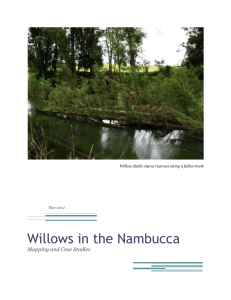Kirsty Pate
advertisement
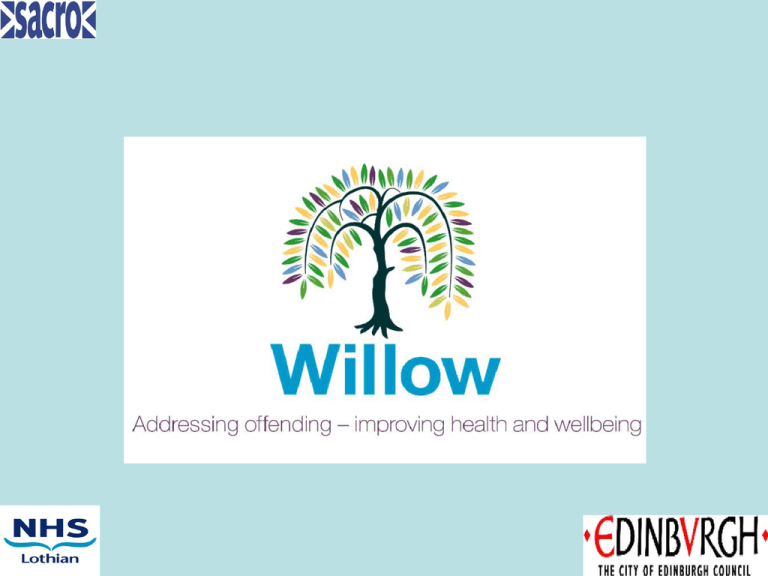
Context of Willow development • women commit less crime, particularly less serious crime • Scotland continues to incarcerate women at a disproportionate rate • No evidence of increased incidence or seriousness of crime committed by women • Women in prison found to have ‘exceptionally high levels of health need’ Context of Willow development • Prison Health in Scotland (2007) • Equally Well (2008) • Scottish Parliament Equal Opportunities Committee (2009) • Lothian and Borders CJA commissioned and published research about the specific profile of women offenders locally (Barry and McIvor, Chaotic Lives, 2009) Distinctly Complex Needs • Experiences of abuse and trauma • High prevalence of mental ill health and self harm • Substance misuse • Poverty • Mothers as prisoners • Relationships • Health inequalities A gender specific model of service • Requires input from a range of agencies • Joint working across disciplines • Key roles for health professionals and criminal justice social work • Contribution of the third sector is important • Women should access services from any point within the criminal justice system (2010) Willow aims to: • Reduce offending behaviour • Improve health, wellbeing and safety • Improve women’s access to services How we strive to respond • • • • • • • • • Holistic intervention Pro-active engagement Strengths based Crises responsive Trauma informed Relational approaches Desistence differences Social capital development Women workers PROJECT BOARD NHS Lothian City of Edinburgh Council Criminal Justice Social Work SACRO WILLOW SERVICE MANAGER SACRO SUPPORT WORKER SACRO SUPPORT WORKER PSYCHOLOGY ASSOCIATE SACRO SUPPORT WORKER (OUTREACH) KEEPWELL NURSE CRIMINAL JUSTICE SOCIAL WORKER CRIMINAL JUSTICE SOCIAL WORKER NUTRITIONIST Partners • Harm Reduction Team - addictions • Caledonian and Working with Men – domestic abuse • Edinburgh Community Food Initiative – healthy eating • Edinburgh Festival Theatre – social capital • Access to Industry - employability Programme • Phase 1 - assessment with key worker, nurse and psychology; induction group • Phase 2 groups – including the – trauma group – offending group – health improvement group – social capital activities • Phase 3 groups – social capital activities and moving on work Phase 1 - Induction • Assessment with key worker, the nurse for a health check and to meet with psychologist. • Interests and motivates women and look at what realistic changes they want for their future. • Information about our programmes and getting to know staff and group members. • Stabilisation work takes place • The two day induction programme assists women to quickly engage with the service. Phase 2: Connections (adapted) Programme that promotes attitudinal and behaviour change to help women desist from offending behaviour • Recognising and exploring emotions • Communication skills • Problem solving • Seeing the bigger picture • The impact of offending • Building confidence Phase 2 - Survive and Thrive • Psycho educational programme • 8 sessions • Understanding the NORMAL range of reactions to trauma (some of which will last for years or even decades) and learn new ways of coping. Includes: • • • • • • The effects of abuse and trauma Keeping safe Surviving skills Understanding anxiety understanding depression Understanding flashbacks, nightmares and dissociation Health Improvement programme • Nutrition • Dentist and oral hygienist • Sleep • Domestic abuse • Sexual health & BBV • Drug misuse • Alcohol misuse To build social capital To build cultural capital Reaching Out Reaching In Reaching inside yourself to think about: -your hobbies interests -things you have achieved -things you used to enjoy - your skills Reaching outside yourself to find: -new places to visit -new interests to try -new people to spend time with -old hobbies you had forgotten -new or more developed skills Phase 3: Group Sessions • Self efficacy, taking control • Inspirational women; who can I be and how will others manage my change • Presentation skills • Confidence • Money Management • Employability Phase 3: Qualifications & Interest Visits Opportunity to gain certificates & increase employability such as: - Food Hygiene Certificate - First Aid Certificate And visits to demystify community facilities such as: - Local Colleges - Volunteer Centre - Scottish Parliament Outcomes • Personalised goals for individual women • Self report, observation and professional assessment • Standardised assessments: – Clinical Outcomes on Routine Evaluation (CORE) – Post Traumatic Stress Disorder Checklist (PTSD) – Hospital Anxiety and Depression Scale (HADS) Observation, Professional Assessment & Self Report • • • • • Planned use of primary care services Changes in diet Positive changes in their relationships Positive changes in how they view themselves Reduction in frequency and seriousness of offending • Improved, stabilised, reduced substance use • Participating in pro-social activities, some of benefit to others • Increased physical activity Post Traumatic Stress Disorder prevalence and outcomes • 77% pre-intervention presented with symptomology consistent with Post Traumatic Stress Disorder • all women (except 1) had clinical and statistically significant improvements, post intervention • only 1 woman has remained symptomatic post intervention CORE Scores All women (except 1) had clinical and statistically significant improvements, post intervention in the areas of • Wellbeing • Problems/symptoms • Life functioning Not in ‘Risk’ “Just thought it would be nice to drop you a wee letter as there is a few things I would like to say to yous all. Carina and Terry you turned my life right round. I am not saying everything is perfect but you helped me to get the strength to cope much better than I have in my whole life and I don’t have the words to tell yous how much I am so grateful to you for this. I know people will say they will never forget people but I know till the day I take my last breath the willow workers will always be with me every day helping me cope better with every day life. Sally, just to let you know I am still making your Sheppard's pie. My kids love it. They ask me to make it every time they come through to visit. Thank you for taking the time to teach me these skills. Sarah you gave me so many coping methods that I still use today. I could never have got through some of the things I have had to deal with in the past few months if it were not for you. I have started a course with transitions called Flash Beauty. I could never have done this if it wasn’t for Willow. I really hope you keep going helping the women who really need it. My biggest thanks is for never ever judging us because that is something we all fear. Good luck to yous all in the future”. External Evaluation • Saw a different version of themselves which was more positive and hopeful about moving away from offending • Safe, supported and respected, much of which related to the project being for women only and workers’ attitudes • Women, staff and external agencies felt Willow offered a viable alternative to custody This is supposed to be a punishment but it has been the best thing that ever happened to me. This is the only time I get to think about me, to take that breathing space that up to now I have never had. External Evaluation I am learning to take care of myself and found out that I was a diabetic. I had been dizzy in the past and just thought it was normal but it's not. . I enjoy the company of the people in the group and never had any reason to feel unsafe, which is a good thing for me I want to be alert and be able to hear what the women are saying and interact. I asked the doctor to bring my methadone down and for the first time in years I am feeling more awake and I have a reason to be awake. Costs • £184k per year to work with up to 60 women completing the programme • 1 prison cell for 1 year costs £55k

